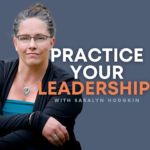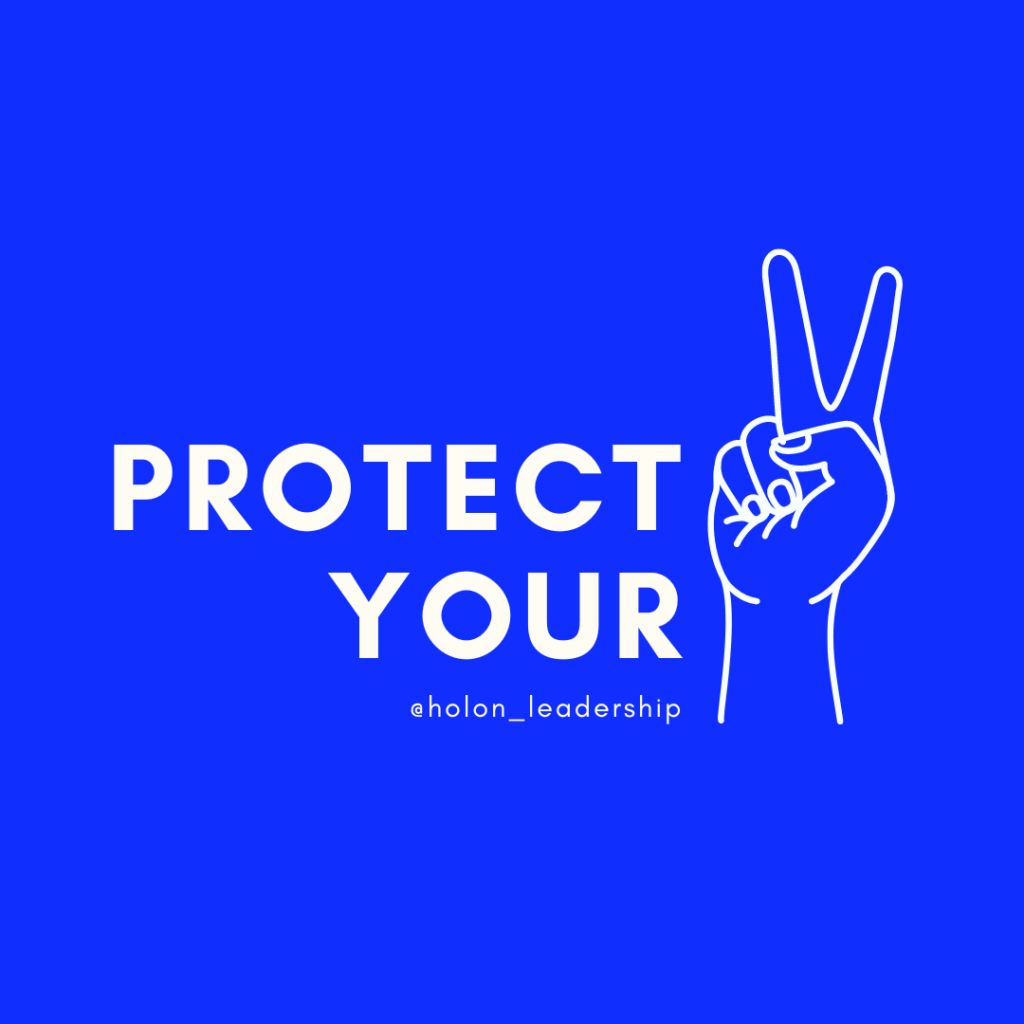Hi everyone. I’m Saralyn Hodgkin, and this is the podcast to practice your leadership.
What would it look like if you took a restful approach to your work? And I don’t mean restful like, Uh, sloth like or snooze and naps, though those are all needed, required, for sure, for sure, for sure. What I mean is what would it actually look like to protect your peace when everything is just coming at you?
When you’ve got all these things on your to do list, and not just on your to do list, but on your Slack channel, in your LinkedIn pings, on your email buzzing around, in your social media prompts, wherever it is that you show up, what would it look like to actually approach things with a restful paradigm?
How would that be able to meet the goal of having some kind of peace, ease in your day, life, moment. What would that look like? Right? There’s a conversation that happens in January around, you know, that, that quitting that people do like they set these great resolutions and then by the second week of January, like done, not like you just shove that donut in your face or you’re like, you’re, you’re back off the bandwagon of the whatever, right?
Like, what would it look like to take that same idea and look at February as possibly that second month of where you start quitting your leadership practices or the intentions you set out. Maybe you even got some budget to do this prof development stuff, or you’ve set up your 2024 calendar, and it’s looking all good.
And then in February comes along, you just get that February blahs, right? Like, And part of what’s going on there, not all of what’s going on, but part of what’s going on is that I can do it. I can attack it, right? Some of these really yang or aggressive words. I can get this stuff done. I will just set myself up better and I’ve got these goals and I’ve got my tools and I’m going to, I’m going to do better.
I’m going to be better. I’m going to do more. I’m going to be more. And I’m going to, I’m going to create these boundaries. I’m going to, I’m going to make my meetings like this, like, right? And we, we come into these practices, resolutions, or into these spaces of, I’m going to get this stuff done, a very Yang like approach to productivity, efficiency, into our work.
And then what can happen is that we just like, the candle just burns right on down so quickly and these intentions, resolutions, systems that we’ve set up, what happens when it gets to be a bit too much in our daily lives or we get worn out or we realize that we’ve over promised and we’re under delivering in some way, right?
And a lot of what can happen in those moments is we start beating ourselves up. I don’t know about you, but for me, I’ve set these intentions to do these things by this date or within this timeline or with these boundaries or with these elements. And then I fall flat. I fall flat.
And. I know that I have gone into places of that I’m not good enough, right? Oh, if I just did better. Saralyn, if you just did better, tried harder, did more, come on. And it’s like, well, that’s not helpful. That just makes me not even really motivated over a long period of time. Maybe in spite of some of those words, I get motivated.
And then I’m like, Oh yeah, I can totally do this. And I get into that stage, but it sure doesn’t help protect my peace. It really burns an energetic quality in me anyways that then I’m just burned and I don’t have anything left in the tank. And then I’m not resilient for my teenagers who need their mom to show up at the most inopportune times of energy and to be there where all of a sudden I feel like I had no rejuvenation time over the holidays.
For example, or where I’m feeling like I don’t just need a nap. I need like a whole bunch of acupuncture needles all over me totally like, I don’t know, just whatever your, your rejuvenation looks like. Like I need, I need lots of acupuncture, warm slippers, like really, really warm tea, my dog. Whatever that looks like for you.
I just all of a sudden need replenishment. So for me, it just brings in the question of what would it actually look like to be a bit more, even proactive isn’t the right word. I’m losing my words here folks. But to start from the day, the month, the year, whatever it is, the season, by trying a restful approach or a restful paradigm.
For example, like what does that mean? It can mean in work that I don’t have to get everything done in this moment. It will still be there tomorrow. And so, while everybody claims that all this stuff that seems to be on my to do list is super urgent, what if I protect my peace of mind, my energy, the peace of my energy, and I decide that these three things need my attention, and these three things are going to wait till tomorrow?
Because I actually have limits on how much I can give at any given time, and I’m going to respect those limits. So that I can give my all to those things that I say yes to. Or, another example might be, in terms of a restful paradigm or a restful approach to the work, is actually, I think one for me actually is in working out.
Like, in 2022, I had a pretty aggressive workout schedule and not aggressive as in I was lifting 250 pounds or whatever, like, no, no, no, no. But whether I felt good or not, I got on that bike. I did that strength training. I was doing that stuff. And part of me felt really great. Like, my calves looked awesome.
My heart was pumping, right? Like, I felt good in many ways, but I didn’t realize that I wasn’t listening to my body anymore. It became a regiment. And then the herniated disc in January 2023 and so on. You know, these, these indications that life throws at you to say, Hey. You might want to take a look at what’s actually going on here.
You’re not actually processing all that anxiety. You’re actually, uh, taking that angst and placing it somewhere else. And it looks really healthy, but, uh, and a lot of it is, but is it all really? And what would it look like to take a restful approach to my workouts? So I still, every morning, my habits, the same, I get up, I do my bathroom routine.
And in that bathroom routine, my sports bra, my workout gear is all hanging up behind the, the, the bathroom door. I don’t think about, should I get into it or not? I just put it on. And then it’s after some morning routine with the kids that I then look around and I go, okay, I’m going to do something with regards to movement.
Is it a 30 minute hit bike or is it a 20 minute, uh, dog walk, uh, in the sunshine or is it, uh, all stretching yin kind of yoga practice? Like, what is it if I stop and listen to my body and what it needs? What does it need? A restful paradigm, a restful approach to looking at the things that are on my plate, like working out, like work.
It just seems to me that finding ways to walk the talk of ease into the very way that we see what we want to get done, the work, the workout, uh, family, deep family conversations. It just seems to me that A prompt here is how do I protect my peace? How do I do that in a way that I can bring a restful paradigm into how I’m seeing what’s in front of me?
How do I reduce the yang like approach to productivity and actually standing in a place where I can find some kind of ease and make some conscious choices and know I’m going to probably piss some people off, but how do I get beyond just setting the right intentions in January and actually keep going?
In some kind of way that doesn’t burn me out over the course of a whole season or even a whole calendar year. What can that, what can that look like? Even when everything is coming at me, family stuff, community stuff, the traffic I’m trying to, uh, get through right here in front of me, you know, or whatever it is.
How can I keep going at a level where I can continue to find ways to move through and protect my peace rather than crashing and burning. How can that? reduce the drama that can get created from the of trying to get everything done all the time, no matter what the cause, but that energy, what does it look like to actually say, Whoa, what can a restful approach offer me when I look at what’s on my plate right here?
How can that help reduce the drama of what’s going on or what could go on and I think another prompt in here for me anyways, and maybe it’s an offer to you all, is what am I actually yearning for in this moment? So if I’m trying to get 500 different projects done in the matter of 15 minutes, what am I actually yearning for here?
Well, I’m yearning to get a whole bunch of stuff off my desk because it’s too much. Well, okay, then the root issue is that I’ve got too much on my desk or, um, what I’m actually yearning for, uh, I’ve got all this stuff and I really want to be able to get this deliverable done and hand this off to this person, and what I actually find that I’m yearning for is I want some applause from my colleagues that I do good work.
Okay, well, let’s deal with that root issue here rather than trying to hustle, improve my worthiness by doing a whole bunch of work that just burns me out over the long term. What am I actually yearning for? What does that actually look like? How do I protect my peace in a way that allows me to achieve or grasp what I’m actually yearning for?
How does that model to my family, to my colleagues? How is that a form of advocacy in the workplace or in the world around standing in my power of deciding what is worth my limited time and energy and that I make those choices and that I am not just trying to do whatever it is everybody else tells me to do for whatever reasons that I’m healing in my childhood, right?
That instead I’m actually advocating for a different way of approaching all that comes at us all all the time and that It’s an approach where I am trying to find some ease, where I am trying to have a way of not just setting an intention with my attention, but I’m trying to live into my intentions in a way that protects my peace and doesn’t burn me out.
That allows me to be able to have a bit of space. That allows me to have some form of resilience in myself, a wider window of tolerance so I can figure out whether I should turn left or right, pivot here, pivot there, because not everything is going to go to plan. What does a restful paradigm look like in how I approach my work, how I approach what’s going on in front of me, and how I approach how I practice my leadership?
Something that I’ve been playing with folks, because I’m seeing so many of us in The drama and the energy drain of just all the swirling that’s going on and that comes at us all the time and that it’s hard to protect ourselves from whether it’s expectations of other people or whether it’s just social media telling us everything all the time.
Whatever it is. It’s
Really is inviting me in to find ways of working, leading, approaching life that helps me practice into ease. And that doesn’t mean that I don’t have stress or that I don’t even have angst, but that is just another flirt for me that when I look at the to do list or the dynamic, Or whatever it is in front of me.
What, what can be offered when I take a restful paradigm or approach? What does ease offer here? What would it mean to protect my peace? What? Or how do I approach situations or dynamics or curiosities in a way that allows me to practice the intentions that I’m setting up for how I want to be and keep going with that.
Life’s too short to just give it all, all at once. It’s also too short to not eat a donut. I mean, sometimes rest is just walking around eating a donut because man, that’s fabulous.
But all that to say is that as we, I mean, when I’m recording this, we’re at a time of February and, and the geography that I live in here in Canada. Ottawa, I feel like it can be the February blues and some of that can really get us down while still having so much thrown at us. And I just keep thinking, wow, some of the intention that I have this year is to protect my peace.
Spend the currency of my energy wisely, invest it wisely, and a restful paradigm or a restful approach has something to offer so that I can do one thing at a time. Everything else can sometimes just F the F off and I can own my power in a way where I can choose ease and get curious about what I’m actually yearning for.
Stay in the practice all
Thanks all. I’m Saralyn you can find me at holonleadership.org. I walk alongside you as you practice your leadership.



 Apple Podcasts
Apple Podcasts Spotify
Spotify Google Podcasts
Google Podcasts